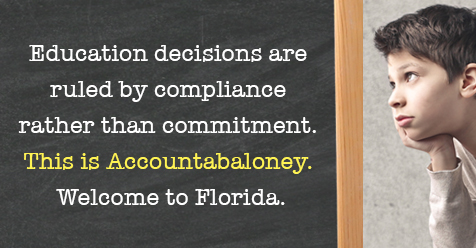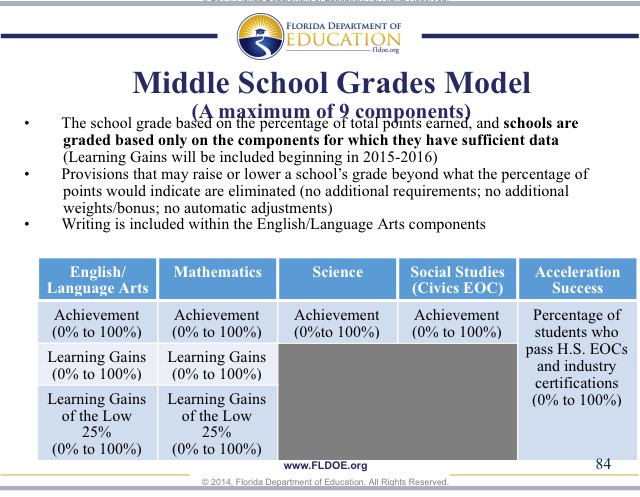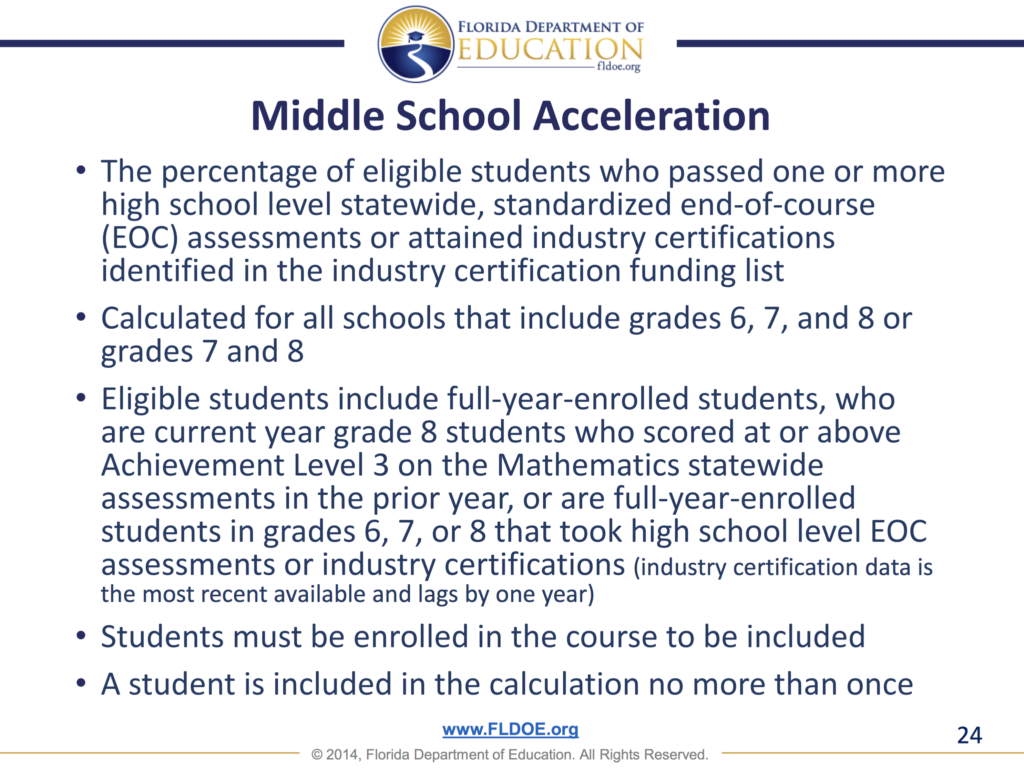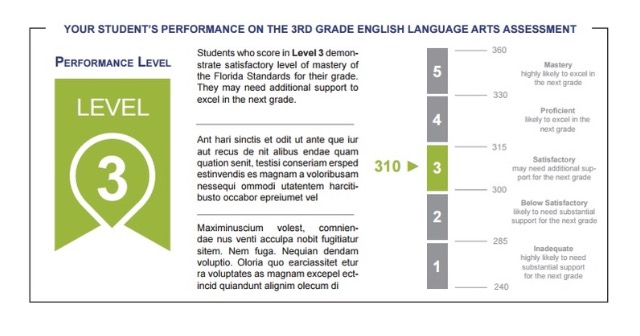Skip Ahead or Remediate? Compliance Rather Than Commitment

A student who scored a 329 (or a Level 2) on their 7th grade Math Florida Standards Assessment (FSA), will receive a report from the state that says they are “likely to need substantial support for the next grade/course” and will, likely, find themselves automatically enrolled into a remedial Math course in 8th grade.
A student who scores a 330 (or Level 3) on their 7th grade Math Florida Standards Assessment (FSA), will receive a report from the state that says they “may need additional support for the next grade/course”, yet their district may accelerate them to high school Algebra, skipping 8th grade Math entirely.
These are real possibilities in a state whether education decision are ruled by compliance rather than commitment. This is Accountabaloney. Welcome to Florida.
On June 22, 2016, Palm Beach County Superintendent, Robert Avossa, addressed the Florida State Board of Education, as a representative of FADSS (Florida Association of District School Superintendents). He discussed his concerns regarding what he described as the over regulation of public schools, saying “so, when you feel like you are so heavily regulated, it is all about compliance rather than commitment to the child and to the work.”
Compliance rather than commitment. That sums up Florida’s current education system.
A perfect example of compliance over commitment can be seen, across Florida, where middle school math placement is often driven by state standardized test scores. In many districts, students find they have been placed into classes not because they requested them, but because FSA scores (or, in some cases, lack of test scores) dictated their class placement.
When Test Scores Determine Placement in Remedial Courses:
Prior to the passage of HB 7069 in April 2015, Florida statute mandated that students scoring a 1 or 2 on the FSA/FCAT must be placed into remedial classes. This led to honors students (who happened to score poorly on the FCAT/FSA) being placed into Intensive Reading and honors classes at the SAME time. (Watch an example, here.) It was, also, fairly common for students to be simultaneously enrolled in Advanced Placement Literature courses and Intensive Reading. Such situations defied reason.
When Governor Scott signed HB 7069 into law on 4/14/2015, it deleted the requirement that students scoring a 1 or 2 on statewide assessment must “enroll in and complete a remedial course.” The bill did not require districts to stop remediating students (intensive courses remain in the course catalog) but enrollment into these classes was left as a local decision.
Apparently, local school-level decision makers didn’t receive the memo.
More than a year after the passage of HB7069, students without FSA scores of level 3 or above continue to find themselves, at many schools and in many districts, enrolled in remedial courses instead of electives. When parents question the placement they are often being told “the school’s hands are tied, this is a state mandate.” (You can learn more, including how to advocate for your child in a similar situation here).
No, it is not a state mandate. Placement in remedial classes is a local decision.
When Test Scores Determine Placement in Advanced Courses:
In addition to determining remedial course placement, test scores are also used by districts to place students into advanced classes, whether the student wants to be in the class or not. Why place a child in an advanced class they don’t want? Perhaps it is to encourage students to pursue a more “rigorous” curriculum. Perhaps… I suspect the real answer may lie in the calculation of school grades.
Middle School Grades are based on the percentage of total points earned in 9 categories, one of which is “Acceleration Success.” Acceleration Success points are determined by the percentage of students who pass High School EOCs (usually Algebra 1) and industry certifications.

In order for a district to have a chance at 100% of the “Acceleration Success” points, all “eligible” students must be placed in either Algebra 1 or an industry certification class. Eligible students include all 8th grade students who scores a 3 or higher on the 7th grade Math FSA, and all students from other grades enrolled in Advanced Math or Industry certification courses. For many schools, this means that any student scoring a 3 or higher on the 7th grade Math FSA would need to be placed in Algebra 1, whether they are ready for it or not.

To be clear, there is no state mandate requiring students who score level 3 or higher on the 7th grade Math FSA to be placed in Algebra 1 in 8th grade. However, middle schools will not be able to score 100% of the “Middle School Acceleration Success” points if these students are not accelerated into Algebra or attain an industry certification.
This leaves us in the strange situation in Middle Schools, where 8th grade students who scored a 3 or better (on the 7th grade Math FSA) are being advanced a grade level into high school Algebra (Algebra 1), skipping 8th grade Math entirely. At the same schools, 8th grade students who scored a 2 (even if it was only a point or two below the level 3 cut score) are being placed in remedial math classes. The choice seems to be “skip ahead or remediate.”
But wait, it gets better…
A Change in the Definition of Proficiency:
In January 2016, after months of deliberation, the Florida Board of Education announced a compromise during the setting of the cut scores for the new FSA (cut scores determine the scores required for each achievement level, 1-5, for each FSA exam). Vice Chair, John Padget, had advocated for rigorous cut scores aligned with proficiency levels on the NAEP assessments, (you can read our blog about that here). Since NAEP proficiency does not align with grade level proficiency, such alignment would have led to massive numbers of failing students throughout Florida, despite being able to perform at what would be called “grade level.” A compromise was reached when the FLDOE agreed to rename the FSA achievement of 3 as “satisfactory” and begin calling level 4 “proficient.” It was a game of semantics but it has interesting consequences. Here is a sample report (this one for 3rd grade ELA FSA). Similar language is used in all FSA score reports.

New FSA score reports were released this year. These new reports were designed to more clearly explain exactly what a Level 1 through Level 5 score represents, on the assumption that parents would feel better about the test if they just understood the results a little better (read more here). The new score reports clearly state that a level 4 score means “proficient” and students achieving this level are “likely to excel in the next course.” On the other hand, students who score in Level 3 “demonstrate a satisfactory level of mastery of the Florida standard” and “may need additional support to excel in the next course.” This means that, according to these new score reports, students who score a 3 on their 7th grade Math FSA, may need additional support in order to do well in 8th grade math. But, as discussed above, in many districts these “level 3 performers” are skipping 8th grade math completely, going straight into Algebra 1. Why accelerate a student who may need additional support for success? It must be to chase school grades.
For the record, nowhere in the Alpine Validity report (link here) or the 2015 FSA Technical Report (link here) is there any evidence that the 7th grade Math FSA is a valid assessment of Algebra readiness, yet many schools are using it to determine course placement. Why do schools use 7th grade FSA scores to determine which students to advance to Algebra 1 when other established and valid Algebra readiness assessments exist? The answer can only be that FSA scores determine the denominator for the Middle School Acceleration Success calculation, and these schools appear to be doing whatever they can to improve their Middle School Acceleration Success scores, whether those students are ready for Algebra or not.
This is compliance over commitment. This is Florida’s education system.
Course placement decisions like these are NOT being made with the student’s best interests in mind. These are decisions made to maximize Acceleration Success points and school grades. What is the harm? Middle school students take Algebra 1 as a high school level course; the state mandated and created Algebra 1 FSA End of Course exam is worth 30% of the student’s grade, which is calculated into the child’s HIGH SCHOOL GPA. Poor performance in Algebra 1 in middle school can affect GPA and college admission chances. Skipping foundational math skills can negatively impact a student’s chance for success in higher level math courses.
Many schools recognize these students are not ready to skip 8th grade math and be accelerated to Algebra 1. Some schools do the right thing and appropriately place these students into 8th grade math. Others, chasing school grades, simultaneously place these students into BOTH Algebra 1 and an Intensive Math “elective” designed to increase the child’s chance of passing the Algebra 1 EOC and scoring Acceleration Success points for the school. Such class placement defies logic.
Class placement decisions that are made for the benefit of school grades are accountabaloney. Such decisions are all too common in Florida: where the focus is on compliance rather than commitment and many middle schools focus on the school grade calculations, ignoring the needs of the child.
It is time to restore Florida’s commitment to the child.

Please stop referring to 8th grade math as “remedial.” The 8th grade curriculum is ideal for preparing students for algebra, focusing on proportional relationships, equations and systems. It also covers about one third of the geometry curriculum, so students are doubly prepared for high school math. As a teacher who has both 7th and 8th grade students in my Algebra 1 Honors (middle school) class, I can tell you it is the students who have been through the 8th grade class that are prepared – not the 7th grade curriculum!
We did not mean to refer to 8th grade math as “remedial.” I’m sorry if you got that impression. Of course, the curriculum is important. We are very concerned that the students advanced to Algebra 1 are missing critical math skills. The issue we were trying to address in this post was that, in some counties, students who score a 1 or 2 on the 7th grade FSA ARE place in remedial math in 8th grade while those scoring a 3 or higher are pushed ahead into Algebra. It does bring up the question as to whether, in those counties, ANY students are being taught the 8th grade curriculum. There needs to be common sense.
It’s 2020 and I am still fighting this. My son’s education is totally suffering. He was placed in all advanced classes 8th grade. FSA and EOC testing didn’t go well. 9th grade he was placed in Intensive classes and level zero classes. Now in 10th grade is being made to take same classes over. He is a straight A student!!! He’s discouraged and I’m just learning what has actually happened. I failed him by not knowing that the school NEVER CARED! How can I fix this?? He wanted to get a scholarship. It can’t happen now.
I am so sorry. Class placement based solely on standardized test score is ridiculous but unfortunately can be common in Florida. The State no longer mandates remediation for low test scores. Parents can override those decisions. The lack of state testing during the Covid shutdown has put districts that rely solely on test scores in unconscionable situations. Students should be promoted and class placement determined based on classroom performance. When the Governor announced the cancellation of spring assessments in March, they said promotion decisions would be made as if the test scores didn’t exist. (http://www.fldoe.org/newsroom/latest-news/florida-department-of-education-announces-additional-guidance-for-the-2019-20-school-year.stml) Please refer to your district’s Student Progression Plan and contact your school to insist on appropriate placement for your child.